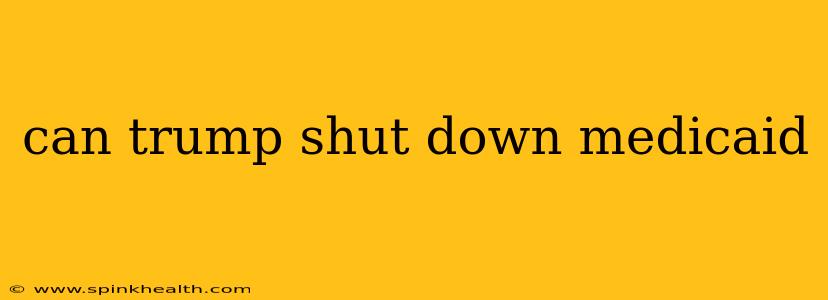Can Trump Shut Down Medicaid? Unraveling the Complexities of Healthcare Reform
The question of whether a president can unilaterally shut down Medicaid is a complex one, steeped in legal, political, and practical realities. While a president holds considerable power, the ability to simply "shut down" such a large-scale, federally funded program is far from straightforward. Let's explore the intricacies of this issue and answer some frequently asked questions.
The Reality: It's Not a Simple "On/Off" Switch
The idea of a president abruptly ending Medicaid is largely a misconception. Medicaid isn't something that can be switched off like a light. It's deeply entrenched in the fabric of the American healthcare system, a joint federal-state program providing healthcare coverage to millions of low-income individuals and families. Any significant changes would require navigating a labyrinthine legal and political landscape.
H2: How Does Medicaid Work? A Necessary Primer
Understanding Medicaid's structure is crucial to grasping its inherent resilience to sudden termination. It's a cooperative program where the federal government provides matching funds to states, which administer the program within their borders. States have flexibility in determining eligibility criteria and services offered, but they must adhere to federal guidelines. This shared responsibility makes unilateral presidential action extremely difficult.
H2: What Powers Does a President Have Regarding Healthcare?
The president's influence on healthcare policy is substantial but not absolute. Executive orders can impact certain aspects of healthcare regulations, but dismantling a program as vast as Medicaid would likely require Congressional approval, given its budgetary implications. Moreover, judicial review would almost certainly be invoked, subjecting any significant changes to extensive legal challenges.
H2: Could a President Significantly Reduce Medicaid Funding?
This is a more realistic scenario than complete shutdown. A president could propose budget cuts to Medicaid, potentially influencing the amount of federal funding available to states. However, this would require Congressional approval and would likely face strong opposition from Democrats and even some Republicans representing states heavily reliant on Medicaid funding. Such cuts would lead to reduced coverage, longer wait times, and diminished quality of care.
H2: What Are the Legal and Constitutional Implications?
The legal challenges to significantly altering or eliminating Medicaid are considerable. The Supreme Court has weighed in on healthcare legislation several times, consistently emphasizing the importance of access to healthcare for vulnerable populations. Any attempts to dramatically reduce or eliminate Medicaid would likely face legal challenges arguing that such actions violate constitutional rights or exceed the executive branch's authority.
H2: What Would Be the Political Ramifications of Major Medicaid Changes?
The political fallout from any attempt to radically alter Medicaid would be significant. Medicaid provides essential healthcare to a substantial portion of the population, including children, the elderly, and individuals with disabilities. Any moves to limit access would be met with fierce resistance from advocacy groups, healthcare providers, and affected communities. Such moves could significantly impact a president’s approval ratings and influence future elections.
Conclusion: A Complex Issue with No Easy Answers
The idea of a president single-handedly shutting down Medicaid is highly improbable given the program's complex structure, legal frameworks, and political realities. While a president could certainly attempt to make significant changes to the program through budgetary adjustments or regulatory shifts, complete elimination or drastic cuts would require Congressional approval and would likely face considerable legal and political challenges. The reality is far more nuanced than a simple "yes" or "no."

